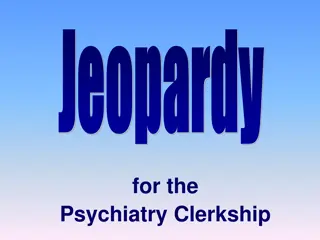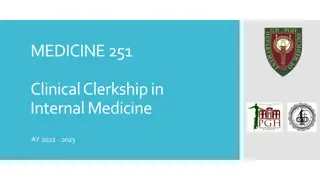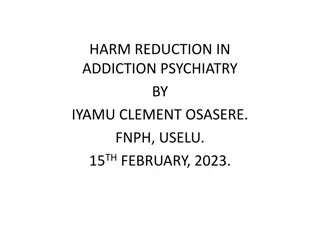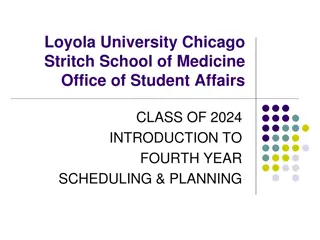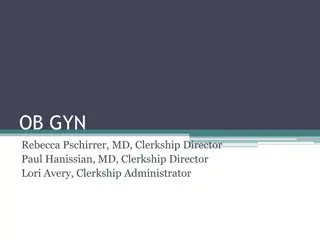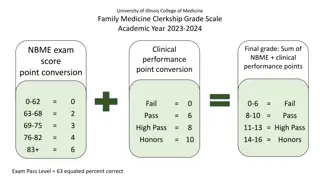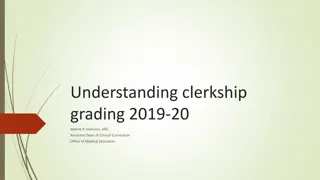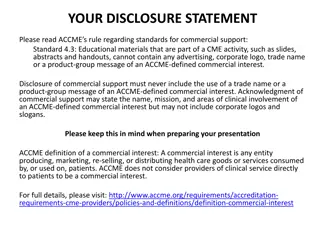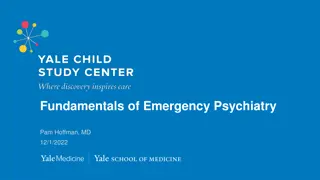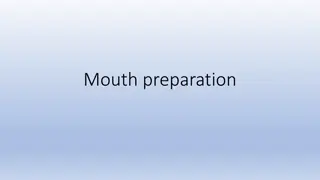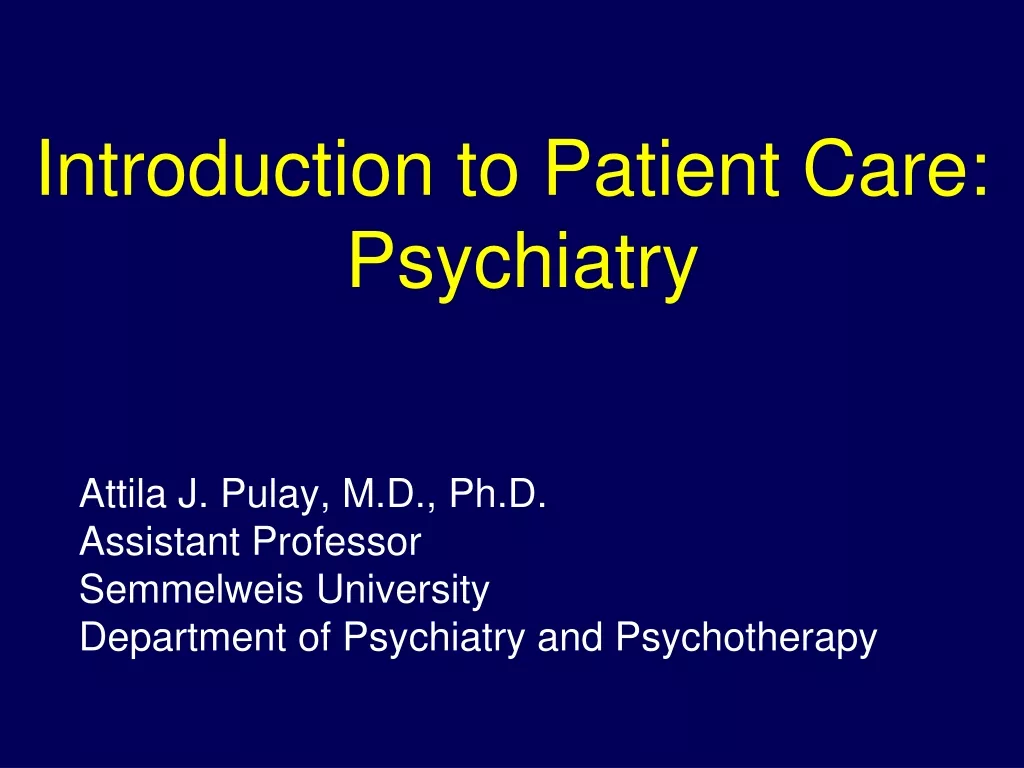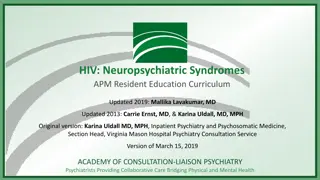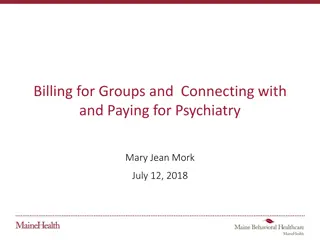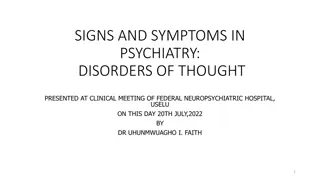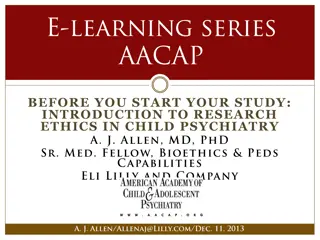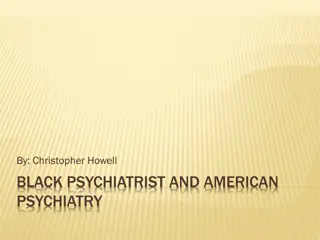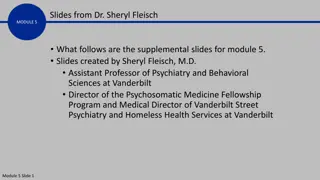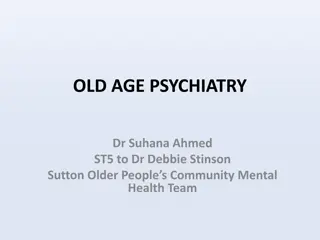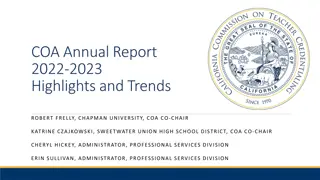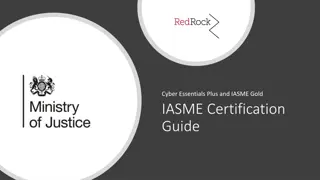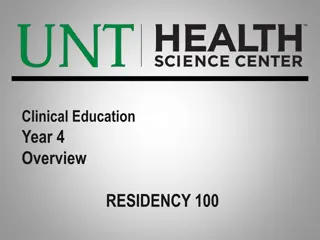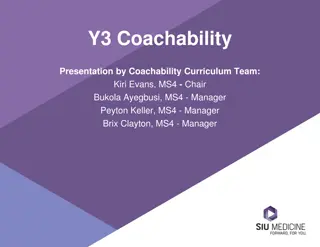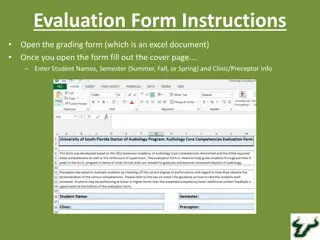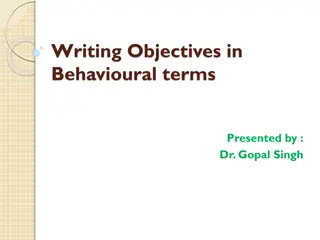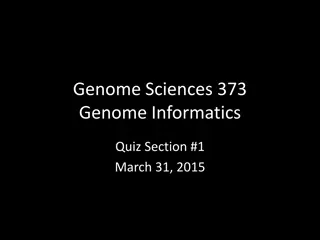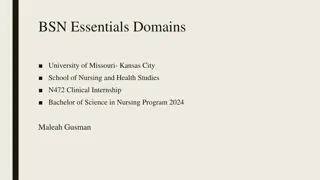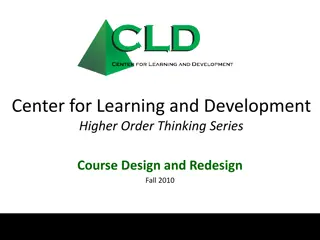Psychiatry Clerkship Essentials: Course Objectives and Preparation
Explore the essential aspects of psychiatry clerkship, including course objectives, the importance of training in psychiatry, and recommended preparation before starting. The course covers topics like psychiatric disorders, attitude towards psychiatry, and development of clinical skills. Self-assessment exercises are also included to enhance learning and understanding of diagnosis and classification in psychiatry.
- Psychiatry Clerkship
- Course Objectives
- Psychiatry Training
- Clinical Skills
- Diagnosis and Classification
Download Presentation

Please find below an Image/Link to download the presentation.
The content on the website is provided AS IS for your information and personal use only. It may not be sold, licensed, or shared on other websites without obtaining consent from the author. Download presentation by click this link. If you encounter any issues during the download, it is possible that the publisher has removed the file from their server.
E N D
Presentation Transcript
KSU-College of Medicine Psychiatry Department -------------------------- Course 462 - Psych Course Objectives 1 14/11/35 Prof. Mohammed A Al-Sughayir
Negative vs. Positive Attitude Negative attitude Positive attitude Vague/due to poor adherence to religion/always due to supernatural causes. Many aspects have been scientifically explored & approved >>> good Rx. Etiology Subjective / unscientific. Objective criteria & Scales. Diagnosis Deleterious / addictive. Benefit > risk in general. Medications Always bad. There are many disorders with good prognosis. Prognosis Mad / bad / sad / aggressive / not easy to like / have low faith in Allah. Human beings deserve respect. Patients Mentally unstable because of patients. Like other clinicians but some may.. !? Clinicians Unscientific & unappealing. Scientific / Biopsychosocial approach. Psychiatry 2 14/11/35 Prof. Mohammed A Al-Sughayir
Importance of Psychiatry Clerkship One of the essential qualities of the clinician is interest in humanity. Training in psychiatry will expand your understanding of the spectrum of human perception, thinking, emotion, and c behavior. This will serve you well in self-awareness, interpersonal relationships, and patients' care. Whatever medical specialty you choose in the future, training in psychiatry will upgrade your clinical skills in: Putting the patient at ease. Recognizing the patient's state of mind. Understanding the patient's suffering. Expressing empathy for the patient's suffering. Establishing good rapport with you patient. 3 14/11/35 Prof. Mohammed A Al-Sughayir
Before Psychiatry Clerkship Neuroanatomy Neurophysiology Neurotransmitters It is advisable to review these basics. Clinical Psychology See Basic Psychiatry chapter 1. 4 14/11/35 Prof. Mohammed A Al-Sughayir
Self-assessment Mention the 3 objectives of this course. 1- Knowledge (psychiatric disorders: classification, features, etiology, epidemiology, course, treatment, & prognosis). 2- Attitude (to adopt a positive attitude toward psychiatry as a specialty, patients, psychotropic treatment, ). 3- Skills (psychiatric history, MSE, interview skills, eliciting signs & symptoms). 5 14/11/35 Prof. Mohammed A Al-Sughayir
Diagnosis & Classification in Psychiatry 6 14/11/35 Prof. Mohammed A Al-Sughayir
Self-assessment 1- J. A. is a 48-year-old woman brought by her husband to the emergency department with 4-day-history of insomnia, agitation, and headache. Her husband insisted on having brain CT scan done for her. Would you request brain CT scan for her or not? explain why. No, because nothing so far justify ordering CT scan; no clues of organic cause, her features can be explained by a non-organic mental cause (e.g. depressive disorder, anxiety disorder, ). 7 14/11/35 Prof. Mohammed A Al-Sughayir
Self-assessment 2- Mention the main clinical clues of organic cause. 1- Disturbed consciousness . 2-Disturbance in cognitive mental functions. 3-Abnormal vital signs (e.g. fever, high BP..). 4-Presence of physical diseases (e.g. DM. HTN. BA. SLE .). 5-Presence of neurological deficit (e.g. nystagmus, hemiparesis, numbness, .). 8 14/11/35 Prof. Mohammed A Al-Sughayir
Clinical Interview in Psychiatry 2- Interview Proper 1- Opening 3- Closure 9 14/11/35 Prof. Mohammed A Al-Sughayir
Self-assessment 1.Mention the items of history taking in psychiatry. Identification data. Source of referral. Chief complaint. History of present illness. Family history. Personal history. Medical history. Past psychiatric history. Premorbid personality traits. Prof. Mohammed A Al-Sughayir 10 14/11/35
Self-assessment 2. Mention the items of mental state examination. Appearance /Behavior / Attitude. Speech. Affect. Perception. Thoughts /Abstract thinking. Judgment. Insight. Cognitive Functions. 11 14/11/35 Prof. Mohammed A Al-Sughayir
Self-assessment 3. A psychiatrist asked a patient to express his current feelings during the interview. What was the psychiatrist assessing? a.Concrete thinking. b.Self-awareness. c.Subjective affect. d.Objective mood. Answer >>> C 12 14/11/35 Prof. Mohammed A Al-Sughayir
Etiology in Psychiatry 13 14/11/35 Prof. Mohammed A Al-Sughayir
Self-assessment Mention the main causative factors of mental disorders. A- Biological Genetic : e.g. in schizophrenia , mood disorders , panic disorder and agoraphobia. Neuro-pathological: e.g. dementias ,delirium. Endocrino-pathological: e.g. hyperthyroidism / hypothyroidism. Pharmacological: side effects of medications e.g. steroids > mood changes. B-Psychological: behavioral ,cognitive , or psychodynamic problems. C- Social: e.g. marital discord /occupational problems/financial difficulties. Bio Psycho Social Causes 14 14/11/35 Prof. Mohammed A Al-Sughayir
Dealing with patients' beliefs about supernatural causal attributions Black Magic Devil Possession Evil Eye 15 14/11/35 Prof. Mohammed A Al-Sughayir
Self-assessment J. E. is a 42-year-old mother of 8 children has bronchial asthma and hyperthyroidism. Her parents separated since her childhood. She has several weeks' history of irritability, tremor, and insomnia. She is worried about the cause of her problem. Her aunt told her that:" your illness is due to an evil eye". What would be your next step? a. Convince her that evil eye is not the cause of her problem. b. Inform her that parental separation is the precipitating factor. c. Take detailed psychosocial history and ask about current medications. d. Explain how bronchial asthma has precipitated her illness. Answer >>> C 16 14/11/35 Prof. Mohammed A Al-Sughayir
History taking in psychiatry 1-See the demonstration model in the video clip below. 2- See and play the role of the psychiatrist in the practice part in the video clip below. 3- Practice with a colleague. Proper practice makes perfect 17 14/11/35 Prof. Mohammed A Al-Sughayir
Self-assessment Mention the items of history of present illness . Onset. Nature of symptoms. Severity. Etiological factors. Course. Duration. Effect on the patient s life. 18 14/11/35 Prof. Mohammed A Al-Sughayir
How to assess personality traits 1-See the demonstration model in the video clip below. 2- See and play the role of the psychiatrist in the practice part in the video clip below. 3- Practice with a colleague. Proper practice makes perfect 19 14/11/35 Prof. Mohammed A Al-Sughayir
Self-assessment A psychiatrist asked a patient about the patient's reaction to usual life stresses. What was the psychiatrist assessing? a.Thinking process. b.Personality traits. c.Judgment. d.Personal history. Answer >>> B 20 14/11/35 Prof. Mohammed A Al-Sughayir
How to assess obsessions 1-See the demonstration model in the video clip below. 2- See and play the role of the psychiatrist in the practice part in the video clip below. 3- Practice with a colleague. Proper practice makes perfect 21 14/11/35 Prof. Mohammed A Al-Sughayir
Self-assessment H. M. is a 23-year-old newly married woman has recurrent persistent images in her mind about harming her husband with a knife. She knows that these images are senseless, silly, and should be resisted, but she cannot make them go away. What is this psychopathology? a. Compulsions. b.Hallucinations. c. Obsessions. d.Delusions. Answer >>> C 22 14/11/35 Prof. Mohammed A Al-Sughayir


